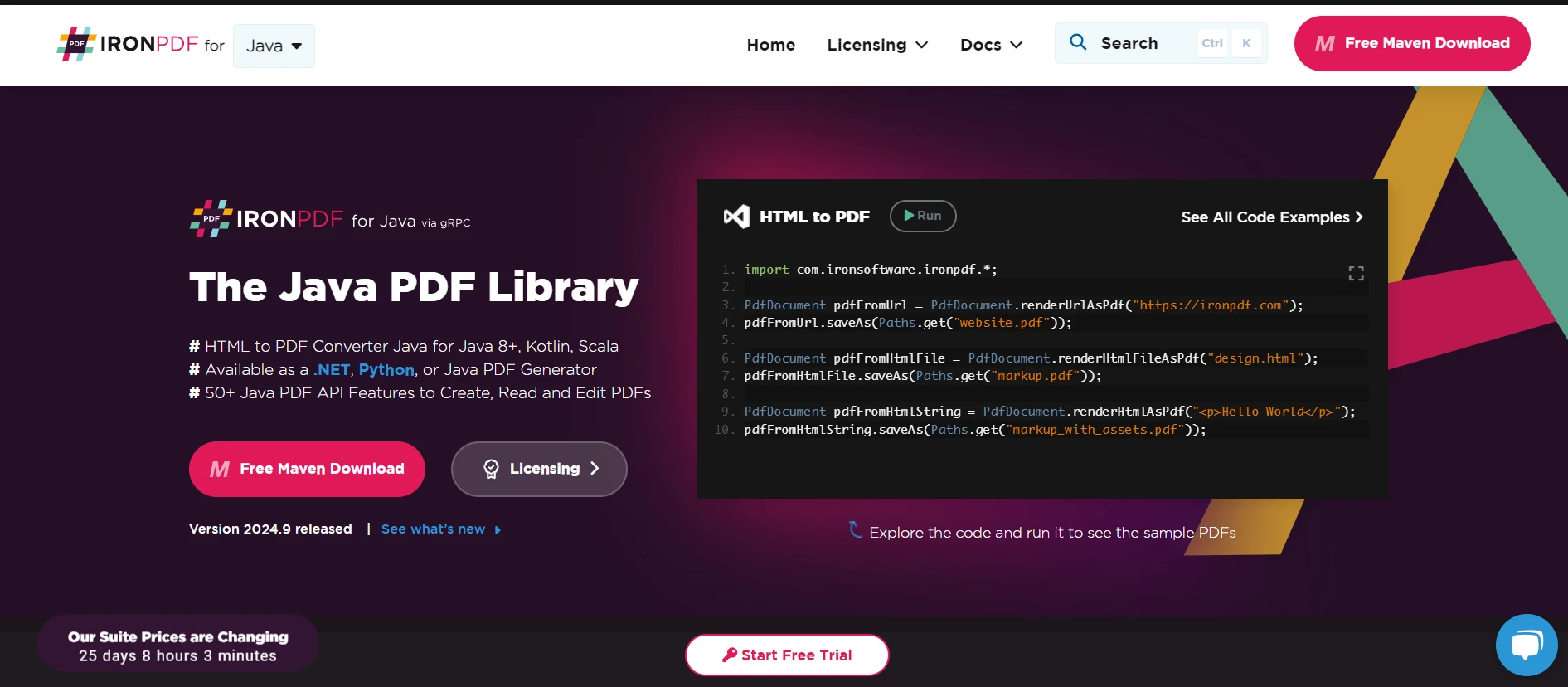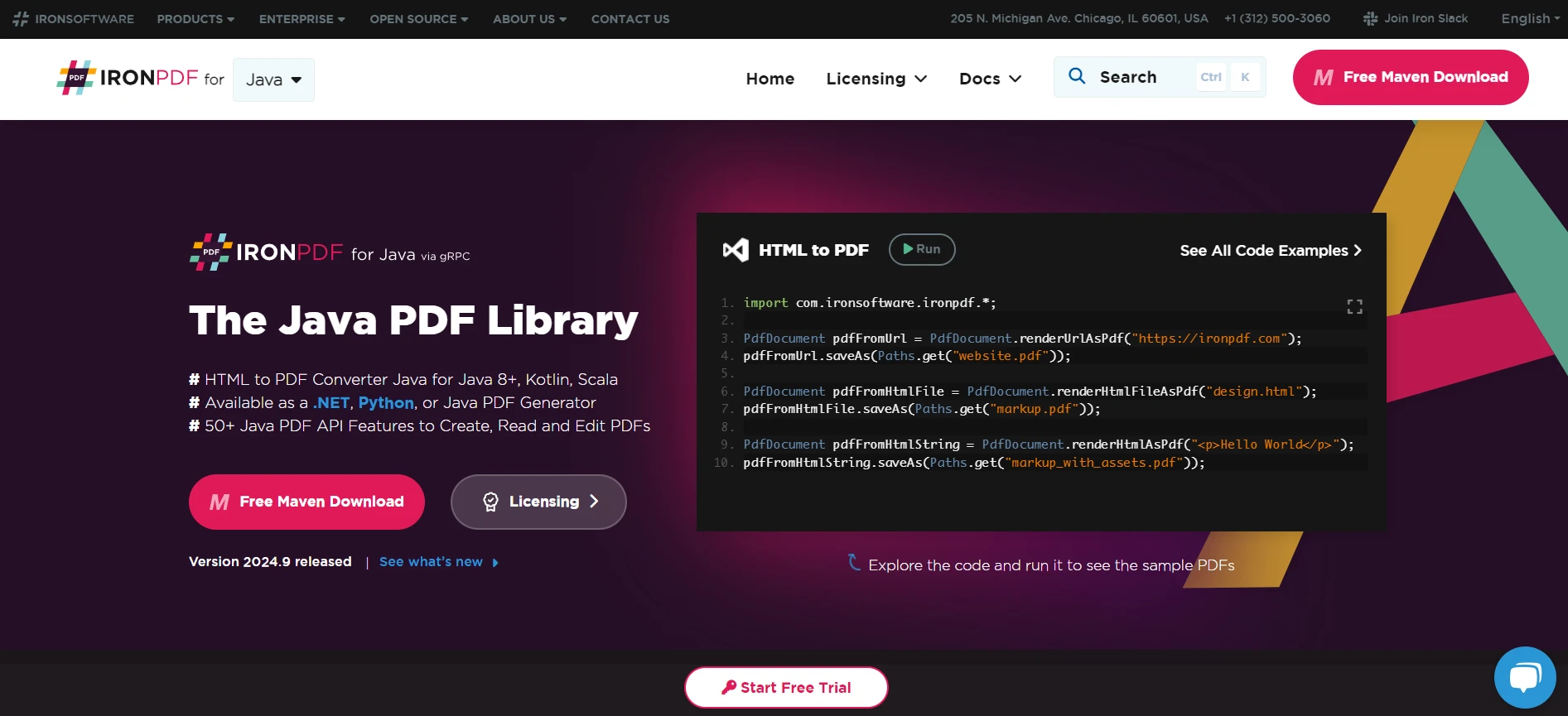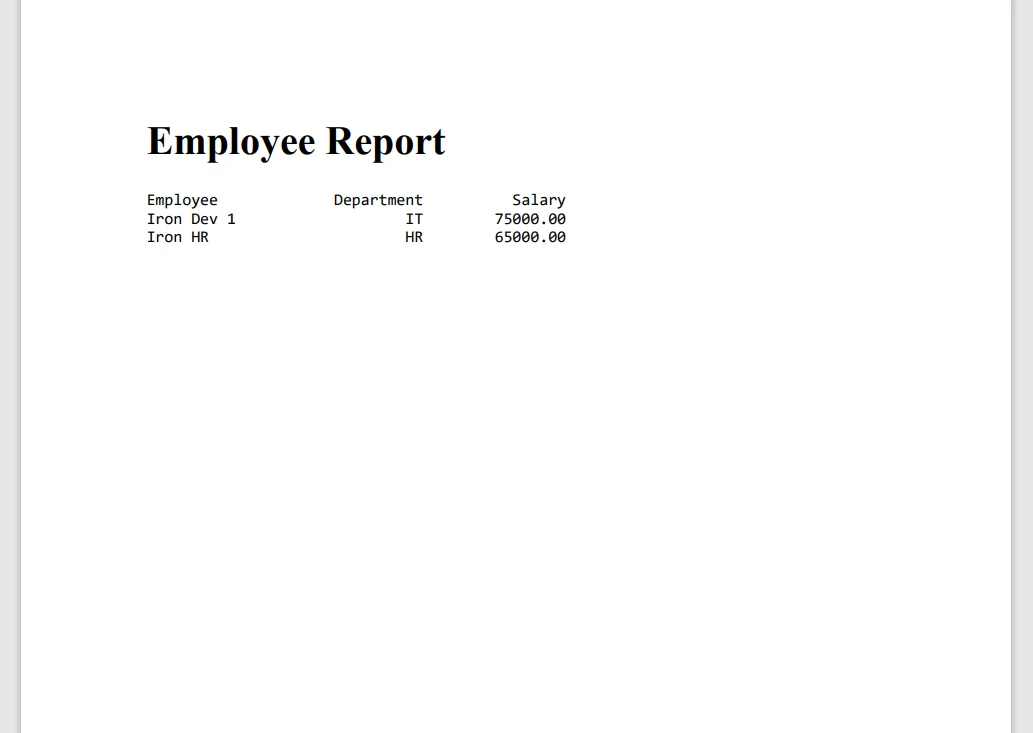How to Use toLowerCase in Java
In Java programming, manipulating strings is a fundamental aspect of various applications. The ability to transform strings to a consistent case, such as lowercase characters or uppercase letters, is often essential. The Java string toLowerCase() method provides a simple and effective way to achieve this transformation.
This article will help you explore the complexities of toLowerCase()—its syntax, practical applications, and examples—to empower Java developers in mastering string class conversion.
Understanding the Syntax of toLowerCase()
The toLowerCase method in Java's String class is a versatile tool for handling character case distinctions. Whether applied to an entire string or specific characters with a specified default locale, this method ensures flexibility and precision in managing uppercase letters.
The toLowerCase() method is part of the java.lang.String class, making it readily available for all Java string objects. The syntax is straightforward:
public String toLowerCase() // Converts all characters to lowercasepublic String toLowerCase() // Converts all characters to lowercaseIt takes no parameters, and the method returns a new string with all the characters converted to lowercase letters. It does not modify the original string; instead, it produces a new string with the characters converted to lowercase.
Practical Applications of toLowerCase()
Case-Insensitive String Comparison
One common use of toLowerCase() is in case-insensitive string comparisons. By converting both strings to lowercase, developers can ensure accurate comparisons without worrying about differences in letter casing.
String str = "Hello";
String str2 = "hello";
if (str.toLowerCase().equals(str2.toLowerCase())) {
System.out.println("The strings are equal (case-insensitive).");
} else {
System.out.println("The strings are not equal.");
}String str = "Hello";
String str2 = "hello";
if (str.toLowerCase().equals(str2.toLowerCase())) {
System.out.println("The strings are equal (case-insensitive).");
} else {
System.out.println("The strings are not equal.");
}Input Normalization
When dealing with user input, normalizing the case ensures consistency in processing. For instance, when validating email addresses or usernames, converting them to lowercase before storage or comparison can prevent unintended discrepancies.
String userInput = "UsErNaMe@eXample.com";
String normalizedInput = userInput.toLowerCase();
// Store or compare normalizedInputString userInput = "UsErNaMe@eXample.com";
String normalizedInput = userInput.toLowerCase();
// Store or compare normalizedInputSearch and Filtering
The toLowerCase() method is valuable when searching or filtering strings, especially when case sensitivity is not crucial. For example, filtering a list of filenames regardless of letter casing:
import java.util.Arrays;
import java.util.List;
List<String> filenames = Arrays.asList("Document.txt", "Image.jpg", "Data.csv");
String searchTerm = "image";
for (String filename : filenames) {
if (filename.toLowerCase().contains(searchTerm.toLowerCase())) {
System.out.println("Found: " + filename);
}
}import java.util.Arrays;
import java.util.List;
List<String> filenames = Arrays.asList("Document.txt", "Image.jpg", "Data.csv");
String searchTerm = "image";
for (String filename : filenames) {
if (filename.toLowerCase().contains(searchTerm.toLowerCase())) {
System.out.println("Found: " + filename);
}
}Examples to Illustrate toLowerCase() Usage
Example 1: Basic String Conversion
String originalString = "Hello World!";
String lowercaseString = originalString.toLowerCase();
System.out.println("Original: " + originalString);
System.out.println("Lowercase: " + lowercaseString);String originalString = "Hello World!";
String lowercaseString = originalString.toLowerCase();
System.out.println("Original: " + originalString);
System.out.println("Lowercase: " + lowercaseString);This example simply converts any uppercase letters in the string to lowercase.
Output
Original: Hello World!
Lowercase: hello world!Example 2: Case-Insensitive Comparison
String input1 = "Java";
String input2 = "java";
if (input1.toLowerCase().equals(input2.toLowerCase())) {
System.out.println("The strings are equal (case-insensitive).");
} else {
System.out.println("The strings are not equal.");
}String input1 = "Java";
String input2 = "java";
if (input1.toLowerCase().equals(input2.toLowerCase())) {
System.out.println("The strings are equal (case-insensitive).");
} else {
System.out.println("The strings are not equal.");
}The method converts both strings to lowercase before comparing them, showing they are equal irrespective of their original casing.
Output
The strings are equal (case-insensitive).Example 3: Normalizing User Input
String userInput = "UsErInPut";
String normalizedInput = userInput.toLowerCase();
System.out.println("Original Input: " + userInput);
System.out.println("Normalized Input: " + normalizedInput);String userInput = "UsErInPut";
String normalizedInput = userInput.toLowerCase();
System.out.println("Original Input: " + userInput);
System.out.println("Normalized Input: " + normalizedInput);This example highlights how converting input to lowercase can address issues with inconsistent casing, such as when comparing usernames or passwords.
Output
Original Input: UsErInPut
Normalized Input: userinputEmpowering Java PDF Handling with IronPDF: Leveraging String Operations
Introducing IronPDF for Java
Explore IronPDF for Java is a robust Java library designed to simplify the creation, manipulation, and management of PDF documents. Whether you're rendering HTML to PDF, converting existing files, or performing advanced PDF operations, IronPDF streamlines the process, making it accessible for developers across different domains.

With IronPDF, developers can leverage a variety of features to enhance their PDF-related tasks, such as text extraction, image embedding, and precise formatting. It provides a comprehensive set of tools to cater to diverse requirements, making it a valuable asset for Java applications that involve PDF handling.
Define IronPDF as a Java Dependency
To start using IronPDF in your Java project, you need to define it as a dependency in your project's configuration. The following steps demonstrate how to do this using Maven.
pom.xml Dependency
Add the following dependencies to your pom.xml file:
<dependencies>
<!-- Add IronPDF Java. Use the latest version in the version tag. -->
<dependency>
<groupId>com.ironsoftware</groupId>
<artifactId>ironpdf</artifactId>
<version>20xx.xx.xxxx</version>
</dependency>
<!-- Adds the slf4j logger which IronPDF Java uses. -->
<dependency>
<groupId>org.slf4j</groupId>
<artifactId>slf4j-simple</artifactId>
<version>2.0.3</version>
</dependency>
</dependencies><dependencies>
<!-- Add IronPDF Java. Use the latest version in the version tag. -->
<dependency>
<groupId>com.ironsoftware</groupId>
<artifactId>ironpdf</artifactId>
<version>20xx.xx.xxxx</version>
</dependency>
<!-- Adds the slf4j logger which IronPDF Java uses. -->
<dependency>
<groupId>org.slf4j</groupId>
<artifactId>slf4j-simple</artifactId>
<version>2.0.3</version>
</dependency>
</dependencies>Download JAR File
Alternatively, you can download the JAR file manually from IronPDF Downloads on Sonatype.
Create a PDF Document using IronPDF
Here's a simple example demonstrating how to use IronPDF to generate a PDF document from an HTML string in Java:
import com.ironsoftware.ironpdf.*;
import java.io.IOException;
public class IronPDFExample {
public static void main(String[] args) {
// Create a PDF document from an HTML string
PdfDocument myPdf = PdfDocument.renderHtmlAsPdf("<h1>Hello, IronPDF!</h1>");
try {
// Save the PdfDocument to a file
myPdf.saveAs("output.pdf");
System.out.println("PDF created successfully.");
} catch (IOException e) {
System.err.println("Error saving PDF: " + e.getMessage());
}
}
}import com.ironsoftware.ironpdf.*;
import java.io.IOException;
public class IronPDFExample {
public static void main(String[] args) {
// Create a PDF document from an HTML string
PdfDocument myPdf = PdfDocument.renderHtmlAsPdf("<h1>Hello, IronPDF!</h1>");
try {
// Save the PdfDocument to a file
myPdf.saveAs("output.pdf");
System.out.println("PDF created successfully.");
} catch (IOException e) {
System.err.println("Error saving PDF: " + e.getMessage());
}
}
}The code generates a PDF created from an HTML string. The output indicates successful PDF creation.
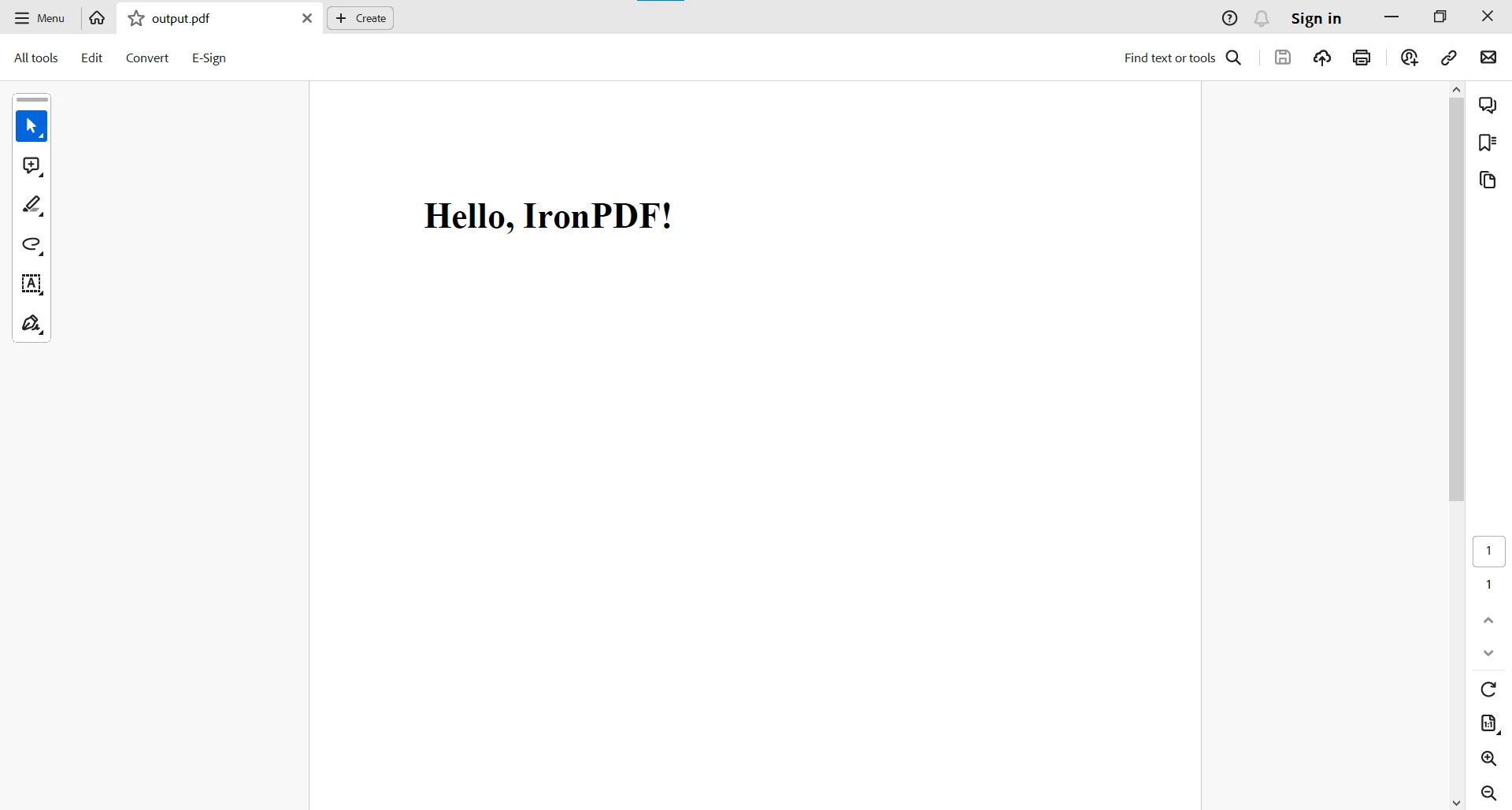
For more complex PDF tasks, you can visit these Java Examples for IronPDF.
String Operations and IronPDF Compatibility
String operations, such as toLowerCase(), are foundational for many programming tasks, enabling developers to manipulate and normalize text effectively. The good news is that IronPDF seamlessly integrates with standard Java string operations.
Here's a brief example of how you might use toLowerCase() in conjunction with IronPDF:
import com.ironsoftware.ironpdf.*;
public class IronPDFExample {
public static void main(String[] args) {
try {
// Create a PDF document from HTML
PdfDocument pdfDocument = PdfDocument.renderHtmlAsPdf("<h1>IronPDF Example</h1>");
// Extract text from the PDF and convert to lowercase
String extractedText = pdfDocument.extractAllText().toLowerCase();
// Create a new PDF with the lowercase text
PdfDocument pdf = PdfDocument.renderHtmlAsPdf(extractedText);
// Save the newly created PDF
pdf.saveAs("ironpdf_example.pdf");
System.out.println("PDF processed and saved with lowercase text.");
} catch (Exception e) {
System.err.println("An unexpected exception occurred: " + e.getMessage());
}
}
}import com.ironsoftware.ironpdf.*;
public class IronPDFExample {
public static void main(String[] args) {
try {
// Create a PDF document from HTML
PdfDocument pdfDocument = PdfDocument.renderHtmlAsPdf("<h1>IronPDF Example</h1>");
// Extract text from the PDF and convert to lowercase
String extractedText = pdfDocument.extractAllText().toLowerCase();
// Create a new PDF with the lowercase text
PdfDocument pdf = PdfDocument.renderHtmlAsPdf(extractedText);
// Save the newly created PDF
pdf.saveAs("ironpdf_example.pdf");
System.out.println("PDF processed and saved with lowercase text.");
} catch (Exception e) {
System.err.println("An unexpected exception occurred: " + e.getMessage());
}
}
}In this example, we render HTML as a PDF using IronPDF, extract text from the PDF, and then apply toLowerCase() to normalize the text. Then we save the file again with lowercase characters. The compatibility lies in the fact that IronPDF operates on PDF-related functionalities, and standard Java string operations, including toLowerCase(), can seamlessly be integrated into the workflow.
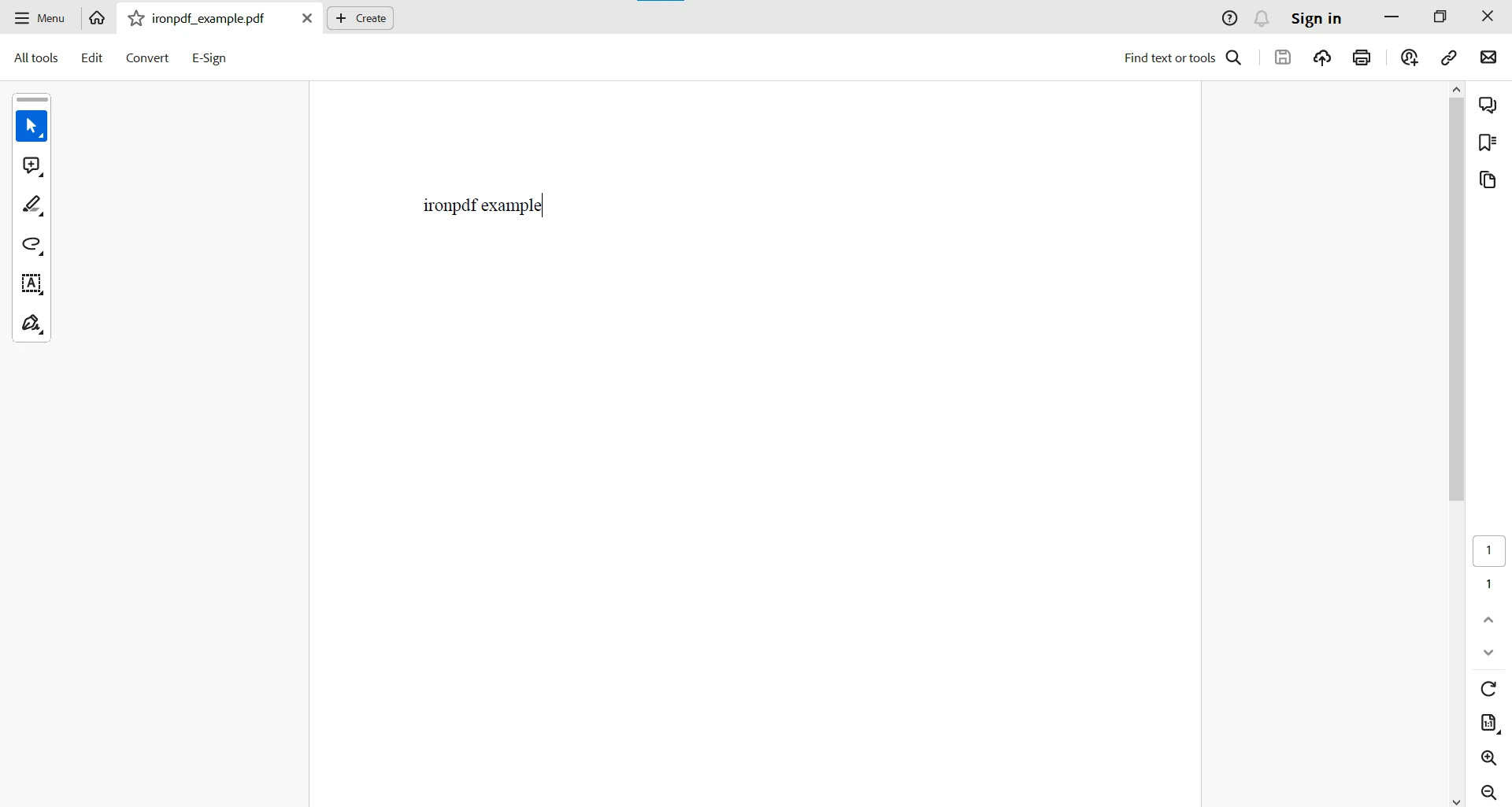
Conclusion
The toLowerCase() method in Java provides a versatile solution for string conversion, enabling developers to streamline various aspects of string manipulation. Whether it's for case-insensitive comparisons, input normalization, or search and filtering operations, mastering toLowerCase() enhances the flexibility and robustness of Java applications. Incorporating this method into your coding arsenal empowers you to create more efficient and user-friendly software, ensuring consistency in string handling and improving the overall user experience.
IronPDF for Java serves as a reliable companion for developers grappling with PDF-related tasks in their applications. As demonstrated, the compatibility of IronPDF with standard Java string operations, such as toLowerCase(), enables developers to apply familiar techniques while handling PDFs. This interoperability ensures that developers can leverage the full power of Java's string manipulation capabilities in tandem with IronPDF, creating a harmonious environment for efficient and effective PDF handling in Java applications.
For more information on working with PDF-related tasks, please visit the IronPDF Documentation.
IronPDF is free for development purposes and needs to be licensed to help developers test its complete functionality before making an informed decision. Download the library from Get IronPDF for Java and give it a try.


